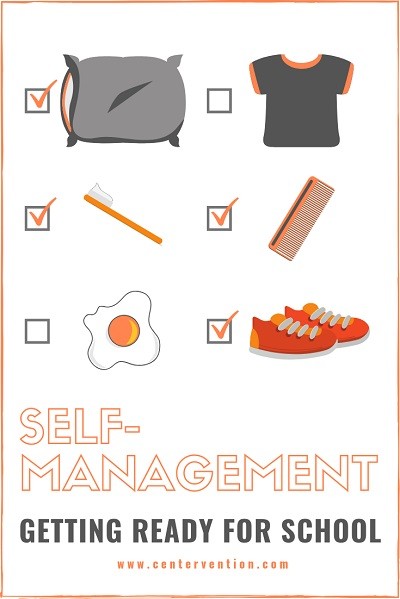
Q: School mornings are a real struggle in my house. My kids have to do just six things each morning: Get up, get dressed, brush their teeth, comb their hair, eat some breakfast and get their shoes on. But, every single morning, I find them dawdling over breakfast or having trouble picking out an outfit. By the time I drop them off at school, I’m frustrated, and they’re upset because I’ve nagged them all morning.
How can I help my kids do better getting ready for school?
Getting ready for school is a constant source of strife for many families
In a survey from Indeed, 62% of moms rated adjusting to a new morning routine as their top challenge when their kids started school.
On those busy mornings, today’s parents often are sleep deprived and stressed about the day ahead as they attempt to wrangle kids who are in no hurry to leave and may not even understand the concept of time.
“The kids don’t understand why it’s important,” said Brad Weinstein, co-author of Hacking School Discipline: 9 Ways to Create a Culture of Empathy and Responsibility Using Restorative Justice, “They are taking their sweet little time. They don’t have the adult’s ability to reason, and what is important to them is not important to you that morning.”
But, said Weinstein, there’s a solution—setting a routine and sticking to it.
“You can’t wake a kid up at 7:45 on one day and 7:30 on another day and 8 on another day. It’s having a consistent bedtime as well as a consistent routine in the morning,” said Weinstein, who also is chief innovation officer for BehaviorFlip. “Once you have a routine that you stick to every day and you don’t deviate from it, that’s when you have success.”
Routines are critical for children. They give kids a sense of security and allow them to develop self-discipline, according to Aha! Parenting, a website created by clinical psychologist and author Laura Markham.
And, while getting ready for school will require kids to complete specific tasks, Markham, in her book, Peaceful Parent, Happy Kids: How to Stop Yelling and Start Connecting, encourages parents to focus also on the benefits of a happier morning.
“Reframe your idea of the morning routine,” she writes. “What if your main job were to connect emotionally? That way, your child would have a genuinely ‘full cup.’ Not only would he be more ready to cooperate with you, he’d be more able to rise to the developmental challenges of the day.”
Weinstein and Markham set out some simple tips to get your routine in order.
Prep the night before
Pack lunches, have your kids lay out their clothes, get backpacks ready and make sure all the shoes are where they should be. “It might take half an hour of struggle to pick the right shirt and the right socks, but, in the morning, that’s not when that struggle occurs,” Weinstein said.
Go to bed on time
A good night’s sleep will help ensure kids are ready to handle the day ahead. The American Academy of Pediatrics recommends a simple nighttime ritual that involves brushing teeth, reading a book or two and going to bed at the same time each night. That consistent bedtime is vital for parents too, writes Markham.
“Your child depends on you to start your own day with a ‘full cup,’” she writes. “There’s no way to stay patient when you’re exhausted.”
Make the morning routine simple
Getting ready for school by doing most of the work the night before means that all your kids need to worry about is getting dressed and eating some breakfast. There’s no last-minute hunt for a homework assignment or a single shoe. “It’s a matter of keeping and sticking to that morning routine because you prepped the night before to make it smooth,” Weinstein said. “It’s frontloading.”
Build in some snuggles
It might sound impossible, but Markham writes that it’s well worth the effort to include five minutes or so to snuggle with each child before you go your separate ways for the day. “If everything else is already done, you can relax for 10 minutes,” she writes. “That time connecting with your child will transform your morning.”
Don’t come to their rescue
“If we always remember things for our kids or bail them out by driving the lunch box to school, there’s no reason for them to ever take responsibility and remember for themselves. By refusing to rescue our kids, we’ll train them for better behavior in the future. But we can’t just spring the no-rescue policy on children without warning—let them know in advance that part of growing up is taking responsibility for themselves, and that you won’t be driving forgotten items to school. If they forget their homework or lunch, they’ll need to face the consequences – they won’t starve, but I promise they’ll remember the lunch box the next day!”
Amy McCready, founder of Positive Parenting Solutions, via Today
Set it to music
“Create a playlist of your child’s favorite songs. Every task (use the bathroom, get dressed, eat breakfast) is connected to one song and must be completed by the time the song is over. Your kids will happily sing along; just make sure they don’t get distracted having a dance party.”
Jill Cedar, a psychotherapist, via Today Parenting Team
Get crafty
“Together with your child, create a chart that details the sequence in which each morning activity should take place. Help her get into the habit of referring to the chart every day. (For pre-readers, use pictures to denote activities, such as a toothpaste advertisement clipped from a magazine to represent teeth-brushing time.) Or have your child make a tape recording in which he reminds himself what to do and when to do it. No more being nagged by Mom or Dad!”
John Taylor, clinical specialist, via ADDitude